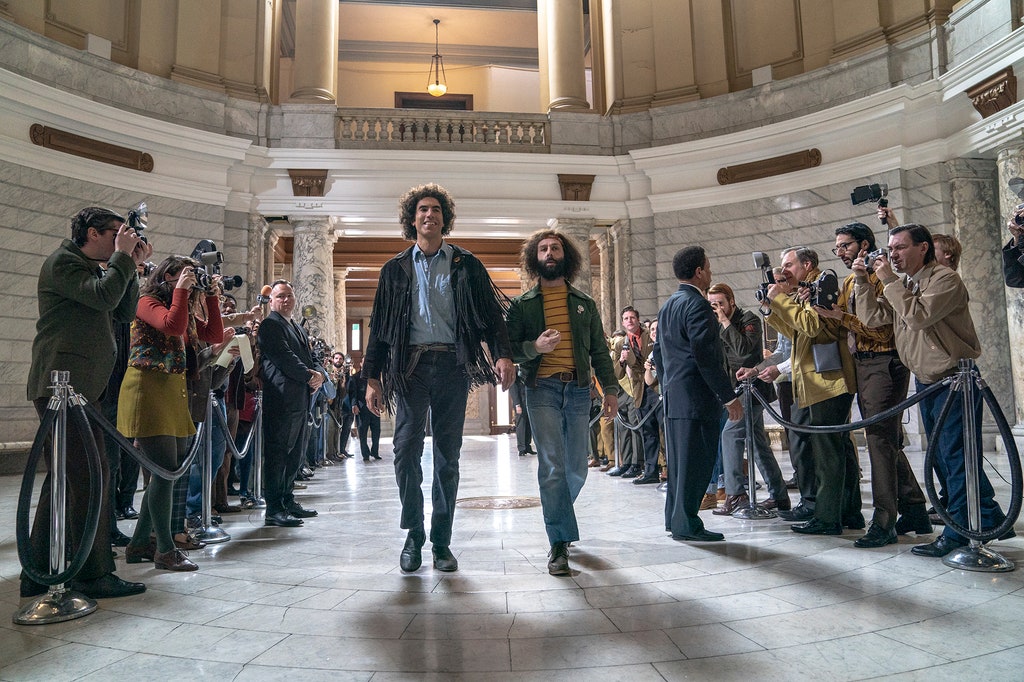Aaron Sorkin’s “The Trial of the Chicago 7” is a really solid film, especially after a summer marred by police brutality and protests. If there was a time when this movie could strike a very raw nerve, this is that time.
There are a few good lessons to take from this one. For one, it’s a history lesson, being that a lot of the craziest things to happen in the film do indeed have accuracy behind them. It’s a difficult pill to swallow for some that, hey, the cops are really awful sometimes and often are ill-equipped to deescalate a situation. But that’s in here, too. It’s a judicial lesson, specifically that judges carry biases and prejudices just like the rest of us. Some are despicable and unfair. These are systemic issues that we should know, but if you just catch on to them because of this movie … better late than never. Welcome to the club. There’s room for everyone in harsh reality.
So much of the film’s depth comes from beyond this social commentary and the Sorkin script. The performances from the ensemble cast, I would argue, are the best part of the film. The players who portray the seven or eight defendants, the attorneys and the judge are all excellent and were brilliantly cast.
Truthfully, that isn’t too unique. In a high-profile 2020 film, having a bad performance amongst the cast is actually more rare than everyone being at least passable. So when you have a few standouts in a single cast, that’s just fine. You can expect such a thing nowadays.
What you don’t expect is for just about everyone to be brilliant. Of the cast, I’d pick out at least seven actors who are really doing some special things with their characters. But even that isn’t what I find to be so admirable about the acting in “The Trial of the Chicago 7.”
The real kicker here is that the actors in “Chicago 7” are playing off of each other exceptionally well, just as the parts that make up any great ensemble do. That’s something that only comes around every once in a while.
This is done properly in this case because each characters has a defined philosophy that they carry with them throughout the film. This causes some very interesting alliances and debates amongst the characters. You don’t just find that in a script. A lot of this execution is based on what each actor brings to the role. Their cadences and demeanor mean a lot in a dialogue driven film like this one.
The best example of this is when Sacha Baron Cohen as Abbie Hoffman and Eddie Redmayne as Tom Hayden have a standoff of ideas, which in itself is a good illustration of the battle between what we’d call the battle between leftists and liberals. Anyway, Hoffman is easy-breezy, even in a debate. He’s sure of how he feels. Hayden is played a little skittish in this context. Maybe he hasn’t gotten this all figured out. Or maybe he’s never actually had to stand up to an intellectual equal. While I would imagine more people see Hayden as the practical one in the conversation, Hoffman is more endearing, focused and altruistic on a global scale. An audience member may very well be swayed to Hoffman’s side, not because Hoffman is necessarily the better thinker, but because he’s played, by design, more assuredly. It’s a very intriguing scene, and one of the many the film has to offer in this vein.
It is important to note that these characters are not merely stand-in projections for the philosophies they align with. Each of the defendants especially are relatively similar in the goal (END THE WAR), but the actors give them the nuance that reveals critical differences in their approach. Again, a script can only do so much. Cue the ensemble to give the words the flavor needed to make the film’s messages work in a meaningful way.

Sam Zavada is a copy editor with The Standard-Speaker in Hazleton. He previously served as the news clerk at The Standard-Speaker, working with the obituaries and the community and lifestyle pages. Sam’s work in print dates back to his time at King’s College, where he spent two years as the editor in chief of the school’s newspaper, The Crown. Earlier in his time with The Crown, he worked as a staff writer and the entertainment manager. Contact him at szavada@standardspeaker.com.




